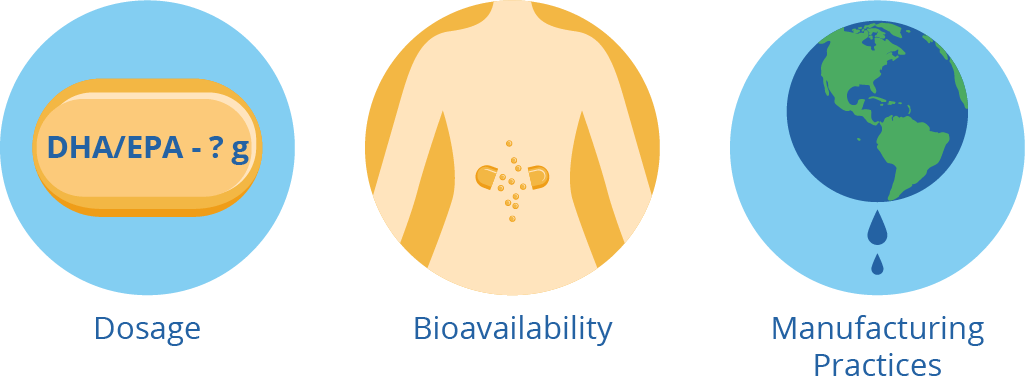Table of Contents
Good nutrition is the cornerstone of a happy, healthy life. But even with the best dietary intentions, many of us may find ourselves lacking essential nutrients, particularly omega-3 fatty acids. One prevalent solution has been fish oil supplements, celebrated for their rich omega-3 content. However, as society becomes more conscious of sustainability and the environmental impact of our choices, traditional fish oil's downsides become apparent. It's not the most sustainable option, and it's not suitable for the growing number of vegans and vegetarians.
Enter algae oil. This sustainable, plant-based source of omega-3 fatty acids has been on the rise, emerging as a compelling alternative to fish oil. With its eco-friendly production and similar nutritional profile to fish oil, algae oil supplements are capturing health enthusiasts' and environmental advocates' attention.
But how does algae oil compare to fish oil, and why might it be the superior choice? Dive in as we explore the world of algae oil supplements and uncover the reasons behind their ascending popularity.
What Is Algae Oil?

Algae oil is a unique oil derived from minuscule organisms known as “microalgae.”
Upon hearing the term "algae," many conjure images of seaweed (or “macroalgae”) that clings to rocks or drifts with the ocean's currents. Alternatively, you might visualize the green layer, often called pond scum, floating atop stagnant water. Surprisingly, these algal blooms are vast congregations of microalgae—tiny, single-celled organisms. Individually, these are too small for the naked eye, but in groups, they manifest as the familiar greenish layer observed in many aquatic environments.
Functioning much like plants, microalgae are photosynthetic. This means they harness sunlight, transforming it into energy. Unlike terrestrial plants, however, microalgae lack roots and stems, drawing essential nutrients directly from the water. Among the many nutrients they synthesize during photosynthesis are omega-3 fatty acids, making them a golden source for this essential nutrient.
Here's the exciting part: these fatty acids are extracted to produce algae oil, offering a sustainable and potent source of omega-3 that's becoming increasingly popular in the nutritional supplement world.
Benefits of Algae Oil
Algae are nature's premier reservoirs of the omega-3 fatty acids eicosapentaenoic acid (EPA) and docosahexaenoic acid (DHA). The intriguing fact? These are identical to the omega-3s found in fatty fish and popular fish oil supplements. If you ever wondered why fish are teeming with omega-3s, it's because their diet is rich in microalgae. Essentially, fish get their omega-3s by consuming these algae.
An exceptional highlight of microalgae is their exclusive status as the only DHA and EPA plant-based sources. Although foods like walnuts, chia seeds, and flaxseeds boast another omega-3 type, alpha-linolenic acid (ALA), they don't hold the same nutritional stature. ALA requires conversion into DHA and EPA for our body to derive potential health perks. Given this conversion is not the most efficient, sourcing DHA and EPA directly from algae oil or similar supplements is a strategic nutritional move.
 Here's what makes algae-based DHA and EPA so sought after:
Here's what makes algae-based DHA and EPA so sought after:
- Heart health: Omega-3s are linked to reduced risks of heart diseases.*
- Brain health and development: Essential for cognitive functions and memory.*
- Mental health: May help in alleviating symptoms of depression and anxiety.*
- Better sleep: Omega-3s have been associated with improved sleep patterns.*
- Skin health: Can aid in maintaining skin elasticity and hydration.*
Harnessing the powers of algae oil can be a game-changer for those seeking a sustainable, plant-based source of vital omega-3 fatty acids.
Algae Oil vs. Fish Oil: A Comprehensive Comparative Analysis
Why choose algae oil when fish oil supplements have been the go-to source of omega-3 for years?
Historical Dominance of Fish Oil:
In the past, fish oil was celebrated as the ideal supplement for boosting omega-3 intake due to its rich EPA and DHA content. This prominence led to an explosion in fish oil supplements, hailed for heart health and more.*
1. Environmental Impact:

Fish oil production has raised major environmental concerns. Overfishing, harmful fish farming practices, and their consequent effects on marine life have escalated with the growing demand for fish oil products. Enter algae oil: a more sustainable alternative that doesn’t compromise on omega-3 quality. Being plant-based, microalgae require fewer resources and can be cultivated in controlled environments, bypassing the environmental pitfalls associated with fish oil production.
2. Safety and Purity:
A significant concern with fish and their products is the risk of contamination, notably from heavy metals like mercury. Consuming large fish, such as tuna, poses the risk of mercury accumulation. Algae oil offers a cleaner option, rich in omega-3s without exposure to potential toxins.

3. Consistency in Nutrition:
With advancements in biotechnology, microalgae oil can be produced with precision. Factors like pH, nutrient concentration, and temperature can be optimized to yield consistent omega-3 content, offering a dependable nutrition profile.
4. A Versatile Option:
Fish oil, while beneficial, isn't suitable for everyone. It excludes vegans, vegetarians, and individuals with seafood allergies. Algae oil, derived from photosynthetic organisms, caters to a broader audience, including those on plant-based diets. Plus, it eliminates common complaints associated with fish oil, such as the unwanted aftertaste.
5. Cost
Historically, fish oil supplements have been relatively affordable, given their widespread usage and longer market presence. However, as the demand for sustainable and vegan options grows, economies of scale are beginning to favor algae oil. As production techniques for algae oil become more refined and widespread, its cost is expected to decrease even further.
Currently, you might find that high-quality algae oil supplements are priced slightly higher than their fish oil counterparts. However, when weighing the environmental and health benefits, many consumers find the investment in algae oil worthwhile.
Side Effects and Considerations of Algae Oil Supplements
Potential Side Effects
While algae oil supplements, including those rich in algal DHA, are generally considered safe for most individuals, it's essential to be aware of potential side effects. When consumed within the recommended limits—typically not exceeding 3 grams of EPA and DHA daily—most users have a positive experience. However, some individuals have reported mild side effects:
- Gastrointestinal Issues: Some users may experience minor stomach upset, bloating, or diarrhea when using algae oil supplements. This is common with many dietary supplements and usually subsides with time.
- Cholesterol Levels: There have been occasional reports of slightly elevated cholesterol levels. It's essential to monitor your cholesterol when taking any omega-3 supplement, especially if you have existing cardiovascular concerns.*
How Much Omega 3 To Take
The ideal amount of omega-3 from algae oil can vary based on individual needs, sex, and health conditions. For general health and well-being, the National Academy of Medicine recommends:

- 1.6 grams for males
- 1.1 grams for females (more for anyone currently pregnant or breastfeeding).
Falling below these recommendations could lead to omega-3 deficiency. Symptoms might include dry skin, brittle hair, joint discomfort, and mood imbalances like brain fog or depression.
Special Considerations:
The American Heart Association's research suggests that an intake of 0.5-1.8 grams of combined EPA and DHA can offer protective benefits for those specifically targeting heart health. It's crucial to differentiate between types of omega-3s—ensure your supplement primarily provides EPA and DHA rather than ALA.
Absorption Tips:
For optimal absorption of omega-3s, pair your supplement with a meal containing healthy fats. This promotes better nutrient uptake and can enhance the benefits of the supplement.
Choosing the Right Algae Oil Supplement

In the burgeoning world of algae-based omega-3 supplements, consumers have various choices. As the demand for sustainable and plant-based omega-3 sources grows, it's crucial to understand the different forms available and how to select the most effective and ethical product. Let's delve into the nuances of algae pills, algal oil capsules, and more.
1. Dosage and Composition:
- Key Point: Ensure you know the precise amount of omega-3 fatty acids in each serving, specifically DHA and EPA.
- Why it Matters: While some supplements might boast impressive grams per serving, it's essential to discern whether these pertain to DHA, EPA, or other components. Prioritize products that clearly specify the amounts of these vital omega-3s.
2. Bioavailability:
- Key Point: The body's ability to utilize omega-3 fatty acids can vary based on the product's formulation.
- Why it Matters: It's not just about consuming omega-3s but ensuring they're in a form that the body can effectively absorb and use. Consider products that highlight the bioavailability of their algae oil for maximum benefits.
3. Manufacturing and Sustainability:
- Key Point: Investigate the company's practices in producing its algae oil supplements.
- Why it Matters: Ethical and environmentally conscious manufacturing processes are crucial for long-term sustainability. Opt for companies transparent about their practices and the impacts on the environment. This ensures you're benefiting your health and contributing positively to the planet.


